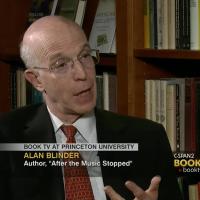Alan Blinder
( economist) | ||||||||||||
|---|---|---|---|---|---|---|---|---|---|---|---|---|
 | ||||||||||||
| Born | October 14, 1945 New York City, New York, U.S. | |||||||||||
| Alma mater | • Princeton University • London School of Economics • Massachusetts Institute of Technology | |||||||||||
| Religion | ||||||||||||
| Member of | Brookings Institution, Council on Foreign Relations/Members, Edge Foundation | |||||||||||
Princeton economist. Advisor to President Bill Clinton. vice chairman of the Federal Reserve from June 1994 to January 1996.
| ||||||||||||
Alan Stuart Blinder is an American economics professor at Princeton University.[1] He is a leading macroeconomist, politically liberal, and a champion of Keynesian economics and policies,[2] and his writings are published in leading corporate media The New York Times, The Washington Post, as well as a monthly column in The Wall Street Journal.
Binder sat on President Bill Clinton's Council of Economic Advisers from January 1993 to June 1994[3] and as the vice chairman of the Federal Reserve from June 1994 to January 1996.[4]
His academic work has focused particularly on monetary policy and central banking,[5] and on the "offshoring" of jobs.
Contents
Background
Blinder was born to a Jewish family[6] in Brooklyn, New York. He graduated from Syosset High School in Syosset, New York. Blinder attended Princeton University as an undergraduate student and graduated summa cum laude with a B.A. in economics in 1967. He completed a 130-page long senior thesis, titled "The Theory of Corporate Choice".[7] He received an MSc in economics from the London School of Economics in 1968[4] and received a doctorate in economics from the Massachusetts Institute of Technology in 1971.[4] He was advised by Robert Solow.[8]
Professional life
Academic career
Blinder is the Gordon S. Rentschler Memorial Professor of Economics and Public Affairs at Princeton where he has been since 1971; from 1988 to 1990, he chaired the economics department.[4] Also in 1990, he founded Princeton's Griswold Center for Economic Policy Studies. And he was vice-chair of The Observatory Group.[citation needed]
Since 1978, Blinder has been a Research Associate of the National Bureau of Economic Research.[9] He is a past president of the Eastern Economic Association and Vice President of the American Economic Association and was named a Distinguished Fellow of the latter in 2011.[4] He is a Fellow of the American Academy of Arts and Sciences (since 1991), a member of the American Philosophical Society since 1996,[10] and a member of the board of the Council on Foreign Relations (since 2008).[11] Blinder's textbook Economics: Principles and Policy, co-written with William Baumol, was first published in 1979 and, in 2012 was printed in its twelfth edition.[12]
In 2009 Blinder was inducted into the American Academy of Political and Social Science, "for his distinguished scholarship on fiscal policy, monetary policy and the distribution of income, and for consistently bringing that knowledge to bear on the public arena."[13] He is a strong proponent of free trade.[14] Blinder has been critical of the public discussion of the US national debt, describing it as generally ranging from "ludicrous to horrific".[15]
Political career
In 1975, Blinder was Deputy Assistant Director of the Congressional Budget Office.
In the 1990s, he sat on President Bill Clinton's Council of Economic Advisers from January 1993 to June 1994,[3][4] and as the 15th Vice Chair of the Federal Reserve from June 27, 1994, to January 31, 1996 (more specifically as the Vice Chairman of Board of Governors of the Federal Reserve System).[4]
As Vice Chairman, Blinder cautioned against raising interest rates too quickly to slow inflation because of the lags in earlier rises feeding through into the economy. He also warned against ignoring the short term costs in terms of unemployment that inflation-fighting could cause.[16]
Many have argued that Blinder's stint at the Fed was cut short because of his tendency to challenge chairman Alan Greenspan. In particular, by challenging assumptions, Blinder disrupted “the whole pipeline of Greenspan-arriving-at-decisions.”[17]
He was an adviser to Al Gore and John Kerry during their respective presidential campaigns in 2000 and 2004.[4]
Event Participated in
| Event | Start | End | Location(s) | Description |
|---|---|---|---|---|
| WEF/Annual Meeting/2004 | 21 January 2004 | 25 January 2004 | Switzerland WEF | 2068 billionaires, CEOs and their politicians and "civil society" leaders met under the slogan Partnering for Prosperity and Security. "We have the people who matter," said World Economic Forum Co-Chief Executive Officer José María Figueres. |
References
- ↑ https://ideas.repec.org/top/top.person.all.htm
- ↑ [1]
- ↑ a b Princeton Economist to Be Named To Clinton's Council, Aides Say, New York Times (archives), Louis Uchitelle, Jan. 4, 1993.
- ↑ a b c d e f g h https://www.princeton.edu/~blinder/bio.htm
- ↑ https://www.princeton.edu/~blinder/articles.htm
- ↑ Stephen Harlan Norwood, Eunice G. Pollack, ed. (2008). Encyclopedia of American Jewish History Volume 1. p. 721
- ↑ Blinder, Alan Stuart. "The Theory of Corporate Choice". Princeton University. Department of Economics.
- ↑ https://mit.primo.exlibrisgroup.com/discovery/fulldisplay?vid=01MIT_INST:MIT&docid=alma990005841370106761
- ↑ https://www.nber.org/people/alan_blinder
- ↑ https://search.amphilsoc.org/memhist/search?creator=Alan+Blinder&title=&subject=&subdiv=&mem=&year=&year-max=&dead=&keyword=&smode=advanced
- ↑ NBER, Curriculum Vitae: Alan Stuart Blinder, accessed 14 August 2001
- ↑ Alan Blinder, Textbooks
- ↑ Princeton University, 24 June 2009, Blinder named fellow of American Academy of Political and Social Science, accessed 14 August 2009
- ↑ http://www.econlib.org/library/Enc/FreeTrade.html
- ↑ https://www.theguardian.com/commentisfree/cifamerica/2012/jan/10/economic-illiteracy-of-economists
- ↑ The New York Times, 18 March 1995, Opening the Fed's Doors From Inside; Alan Blinder Preaches Communication at Tight-Lipped Central Bank
- ↑ Grim, Ryan (Oct. 23, 2009) Priceless: How The Federal Reserve Bought The Economics Profession, Huffington Post
Wikipedia is not affiliated with Wikispooks. Original page source here